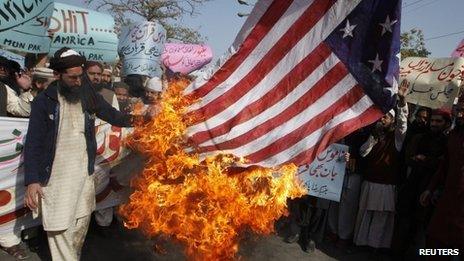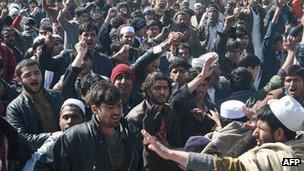Obama and the Koran: Was it wrong to say sorry?
- Published

President Obama did not apologise to Pakistan after a raid accidentally killed 24 Pakistani soldiers stationed along the Afghan border
Being the leader of the free world means never having to say you are sorry.
That appears to be the view of Republican presidential aspirants Mitt Romney, Newt Gingrich and Rick Santorum. All three have been critical ofthe apology offeredlast week by US President Barack Obama following the Koran-burning incident in Afghanistan.
Mr Gingrich, a former Speaker of the House of Representatives, termed the apology an "outrage."
Former Massachusetts Governor Mitt Romney thought it would be "very difficult for the American people to countenance". Former Pennsylvania Senator Rick Santorum suggested Mr Obama's contrition "showed weakness".
The fourth remaining candidate, Texas Congressman Ron Paul, long ago advocated a US withdrawal from Afghanistan. The Koran-burning is not likely to change his mind.
Are these comments by Mr Gingrich, Mr Romney and Mr Santorum - each vying to unseat the president - all about scoring political points?
Let's hope so. The candidates' arguments don't feel wrong so much as dated: debating points from the Cold War era, 30 years ago.
Mr Gingrich, who has suggested it is impossible to "fix Afghanistan", instead demanded an apology from Afghanistan President Hamid Karzai.
He wants contrition from the Afghan leader for the deaths of at least six Nato service members, most thought to be American. The latest two deaths came on Thursday, more than a week after the Koran-burning sparked such outrage. Once again, the deaths were thought to be deadly retribution by Afghan security personnel.
To be fair, the Koran incident has put the unpredictable President Karzai between a rock and a hard place, with little political capital in the bank.
No doubt there should be an Afghan apology as well as an American one - particularly if the Afghan government expects the US Congress and the American people to continue to support this fragile and frustrating relationship.
'Not deliberate'
The fact that President Obama went first is usually considered, well, leadership.
In the Republican debates Mr Romney said he would make decisions regarding Afghanistan based on "conditions on the ground determined by the generals".
The first US official to recognise the danger of the Koran-burning and issue an apology was not President Obama, but Gen John Allen, the commander of US and international forces in Afghanistan.
Gen Allen and his diplomatic counterpart, Ambassador Ryan Crocker, undoubtedly welcomed the political apologies that came from President Obama, Secretary of Defense Leon Panetta and Secretary of State Hillary Clinton.
They understand that the future of the US-Afghan relationship is at stake and with it the sustainability of the counter-terrorism mission in Afghanistan (and from Afghanistan into Pakistan). Those are operations that Mr Romney supports.

Attacks have broken out in across Afghanistan in protest over the Koran burnings
Like Mr Romney, Mr Santorum recognises the importance of the long-term presence. He defines "victory" as staying in Afghanistan long enough to ensure the Taliban is not a security threat.
Depending on the definition of "threat" that could mean staying in Afghanistan for a long time.
An apology, says Mr Santorum, is not required if the mistake, however egregious, was not intentional.
There is no reason, he said, to apologise "for something that was not a deliberate act."
The right war?
But human nature suggests just the opposite.
When we do something unintentional, whether the slight is misinterpreted or manipulated, we are usually quick to add "I'm sorry". We seek to defuse the situation before it becomes a bigger problem.
Politicians, Mr Santorum included, apologise for lots of things on the campaign trail to deny their opponents an advantage.
That is exactly what President Obama did.
The president and his national security team have been focussed, since coming into office in 2009, on the US relationship with the Islamic world.
His speech in Cairo in 2009 was a bold attempt to reset perceptions.
While the effort was noticed, and trends broadly positive, it was constrained by ongoing resentment of US policies and actions, a lingering gap between what the US says and what it does.
This was what made last week's incident dangerous. The president recognised the risk and responded appropriately.
If there is good news, it is that significant violence has been confined to Afghanistan - at least so far. This suggests the rapid response had some positive effect. But it is still too early to tell.
A president should not apologise for every tactical mistake on the battlefield.
President Obama did not apologise to Pakistan for a raid gone wrong late last year that claimed the lives of 24 Pakistani soldiers stationed along its border with Afghanistan.
The Pakistani public, which rates the US about as trustworthy as Americans rate Congress - yes, it is that bad - has noticed.
Whether that judgment is right or wrong, it shows the White House is being judicious in how it deploys presidential power and credibility.
Centre of gravity
The logic of never apologising, never showing what might be weakness in a commander-in-chief, was perhaps appropriate during the Cold War.
But today's struggle is different - a war of perceptions, a battle of ideas, a competition for hearts and minds - within a far more dynamic global communication environment.
The centre of gravity, as the military preaches but does not yet fully practice, is the people - what they think and what they do.
Not the extremists - they need to be defeated - but the broader population. For a time they gave terrorists explicit or tacit support, but have widely turned against them in recent years.
Going forward, the key will be smart power, not raw power. The next president must be prepared to wage the right war, not the last one.
- Published9 March 2012
- Published1 March 2012
- Published1 March 2012
- Published23 February 2012